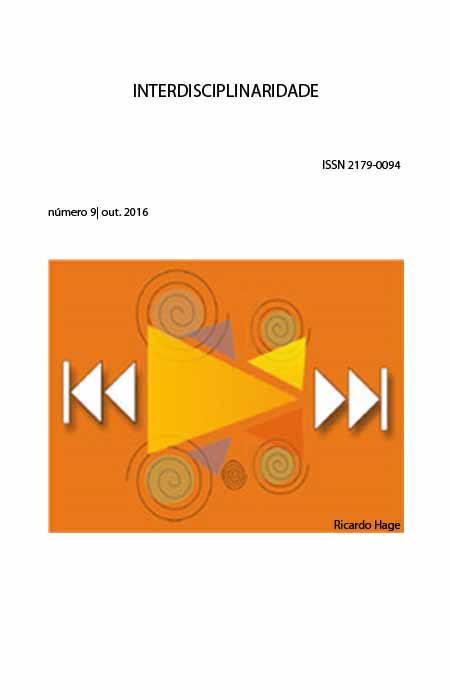CURRÍCULO ESCOLAR, GLOBALIZAÇÃO E IDENTIDADES: novos desafios e caminhos para o educador na contemporaneidade.
Palavras-chave:
Currículo escolar, Globalização, Identidades, Interdisciplinaridade.Resumo
Este artigo promove a reflexão sobre novos desafios e caminhos para um educador na contemporaneidade correlacionando o percurso do currículo escolar, globalização e formação de identidade no contexto escolar. Possibilita-se a compreensão de que as teorias curriculares são desenvolvidas pelas transformações do homem, no cenário político, econômico e cultural, assim como, os educadores participam do processo de formação de identidades dos alunos. Discute-se que a globalização, mesmo que seja uma ideologia, provoca mudanças e cria-se um ‘jogo de forças, tensões ou ‘batalhas’ para o educador em seu cotidiano, o que torna a educação conflituosa, entre o modelo existente e os novos paradigmas emergentes. Como um caminho para esses desafios, sugere-se um trabalho pautado na interdisciplinaridade permeada pelo autoconhecimento. Esse processo representa-se simbolicamente pelo ‘Cavalo de Tróia’, Esse processo representa-se simbolicamente pelo ‘Cavalo de Tróia’, pois é de acordo com a história narrada na obra ‘Ilíada’ de Homero, um dos principais símbolos da famosa guerra de Tróia, usado como estratégia pelos gregos para derrotar os troianos. O guerreiro grego Odisseu teria tido a ideia de construir um gigantesco cavalo oco e presentear os troianos, como um gesto simbólico de rendição da guerra. Os troianos aceitaram o ‘presente’ e levaram o cavalo para o interior das muralhas de Tróia. Centenas de soldados gregos saíram de dentro do cavalo e atacaram a cidade. Assim, a metáfora contempla ao mesmo tempo, aspectos obscuros, inconscientes, elementos ’surpresas’ e recursos criativos que podem ser revelados neste ’campo de lutas. Desta forma, a atitude interdisciplinar e o autoconhecimento poderiam facilitar a ampliação da consciência do educador no sentido da promoção de aprendizados facilitadores para a construção de sujeitos autônomos integrados com a sua natureza e essência.
Métricas
Referências
BURBULES, Nicholas, TORRES, Carlos Alberto (org). Globalização e educação: perspectivas crítica. Porto Alegre: Artmed Editora, 2004.
CIAMPA, Antonio da C. A estória do Severino e a história da Severina. São Paulo: Ed. Brasiliense, 1987.
FAZENDA, Ivani Catarina Arantes. Interdisciplinaridade: História, Teoria e Pesquisa. 2. ed. Campinas: SP: Papirus, 1995.
______. Dicionário em construção: interdisciplinaridade, 2. ed. SP, São Paulo: Cortez, 2002.
______.Interdisciplinaridade: qual é o sentido? São Paulo: Paulus, 2003.
HAMILTON, David. Mudança Social e mudança pedagógica: a trajetória de uma pesquisa histórica. In Teoria e Educação, v. 6, Porto Alegre: Pannonica, 1992a.
HAMILTON, David. Sobre as origens do termo classe e curriculum. Teoria e Educação, v. 6, Porto Alegre, Pannonica, 1992b.
MOREIRA, A. F.; SILVA, T. T. (Orgs.). Currículo, cultura e sociedade. São Paulo: Cortez, 1994.
SACRISTÁN, J. Gimeno. Poderes instáveis em educação. Trad. Beatriz Affonso. Porto Alegre: Artes Médicas Sul, 1999.
SANTOMÉ, Torres Jurjo. Currículo escolar e Justiça social: o cavalo de Tróia da Educação. Trad.: Alexandre Salvaterra. Porto Alegre: Penso, 2013.
SILVA, Tomaz Tadeu da. Documentos de identidade: uma introdução às teorias do currículo. 4. ed. Belo horizonte: Autêntica, 2004.
Downloads
Publicado
Como Citar
Edição
Seção
Licença
Os autores concedem à revista todos os direitos autorais referentes aos trabalhos publicados. Os conceitos emitidos em artigos assinados são de absoluta e exclusiva responsabilidade de seus autores. A Revista Interdisciplinaridade e os textos aqui publicados estão licenciados com uma Licença Creative Commons Attribution-NoDerivatives 4.0 International. Baseado no trabalho disponível em http://revistas.pucsp.br/interdisciplinaridade. Podem estar disponíveis autorizações adicionais às concedidas no âmbito desta licença em http://revistas.pucsp.br/interdisciplinaridade.
A Revista Interdisciplinaridade e os textos aqui publicados estão licenciados com uma Licença Creative Commons Attribution-NoDerivatives 4.0 International. Baseado no trabalho disponível em http://revistas.pucsp.br/interdisciplinaridade. Podem estar disponíveis autorizações adicionais às concedidas no âmbito desta licença em http://revistas.pucsp.br/interdisciplinaridade.


